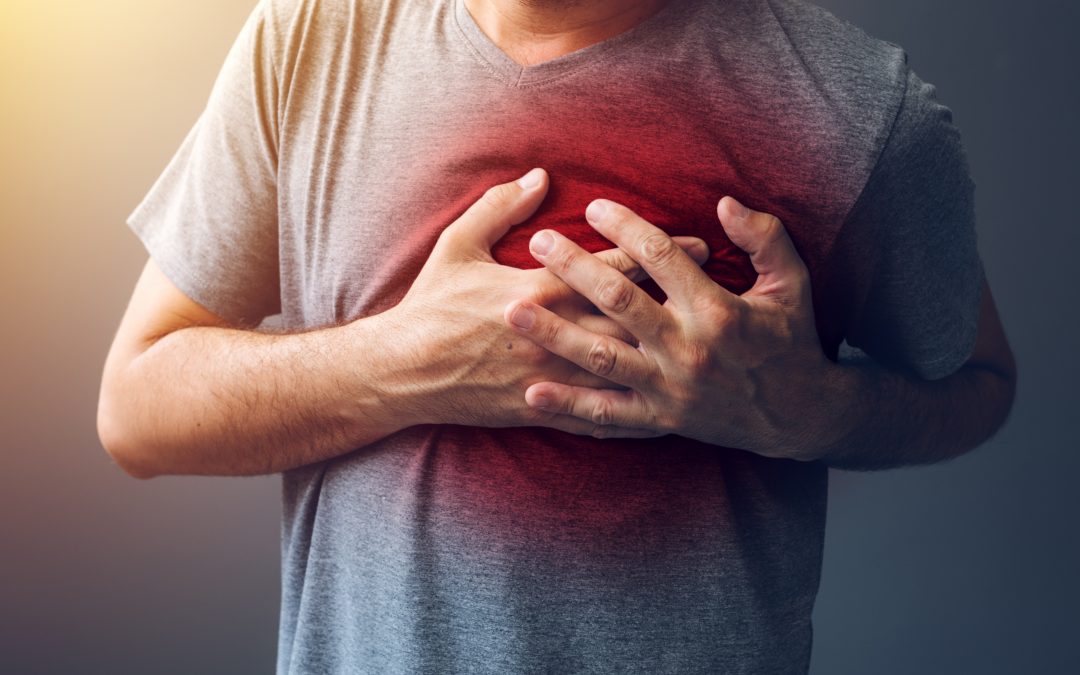 Around 10% of Emergency Department visits in America are related to chest pain. Although angina or a heart attack commonly present as chest pain, a pain in your chest is not always cardiac in nature. While you should always dial 911 for sudden chest pain that travels to your back, left arm or jaw, and is accompanied by breathlessness, dizziness or nausea, most causes of chest pain are not life-threatening. Lung conditions, gastroesophageal reflux disease (GERD), problems affecting the soft tissues in your chest and panic attacks all have chest pain as a symptom. Read on to discover how each of the aforementioned conditions may explain your chest pain.
Around 10% of Emergency Department visits in America are related to chest pain. Although angina or a heart attack commonly present as chest pain, a pain in your chest is not always cardiac in nature. While you should always dial 911 for sudden chest pain that travels to your back, left arm or jaw, and is accompanied by breathlessness, dizziness or nausea, most causes of chest pain are not life-threatening. Lung conditions, gastroesophageal reflux disease (GERD), problems affecting the soft tissues in your chest and panic attacks all have chest pain as a symptom. Read on to discover how each of the aforementioned conditions may explain your chest pain.
Lung Conditions
If you have a sharp pain in your chest that worsens when you inhale and exhale, and you also have a cough or feel breathless, you may have pneumonia or pleurisy, both of which are caused by an infection. In pneumonia, the infection causes inflammation of your lungs, which requires antibiotic treatment. Meanwhile, in pleurisy, it is the membrane surrounding your lungs that becomes inflamed, and while viral causes of pleurisy usually clear by themselves, bacterial infections require antibiotics.
Gastroesophageal Reflux Disease (GERD)
If acid from your stomach comes back up your esophagus, which typically occurs after eating, particularly if you bend or lie down shortly after food, you will experience a burning pain in your chest. Heartburn is usually accompanied by a nasty taste caused by the presence of stomach acid in your mouth. Lifestyle changes, such as quitting smoking, losing excess weight and avoiding trigger foods, can ease symptoms of GERD, though you may need an over-the-counter treatment for heartburn. If your symptoms of heartburn persist despite taking these measures, your doctor may prescribe medication to reduce stomach acid production.
Soft Tissue Problems
If you strain one of the muscles in your chest, you will experience chest pain when you touch the area. Although a strained chest wall muscle is often extremely painful, the muscle will heal with rest. Alternatively, if you suffer from rib pain, which worsens when you breathe in, cough, sneeze or lie down, you may have costochondritis. In this painful condition that lasts several weeks, inflammation develops in the cartilage connecting your ribs and breastbone, and painkillers can help till your symptoms subside.
Panic Attacks
If you feel anxious, your chest pain could be a symptom of a panic attack. Additional panic attack symptoms include palpitations, shortness of breath, dizziness and sweating. Symptoms of panic attacks usually resolve within 20 minutes, but breathing exercises may ease your symptoms sooner. Frequent panic attacks are debilitating, so reducing your risk of panic attacks by adopting a healthy lifestyle, taking part in cognitive behavioral therapy and joining a support group can all reduce the likelihood of an attack.
There are additional causes of chest pain, such as shingles, stomach ulcers and pulmonary embolism, which are beyond the scope of this article. However, whatever the cause of the pain in your chest, it is vital you receive a firm diagnosis. Therefore, if you experience a painful sensation in your chest and have ruled out an emergency situation, you should always make an appointment with your physician. They can then assess your additional symptoms to confirm the cause of your chest pain and commence appropriate treatment.


.jpg)

